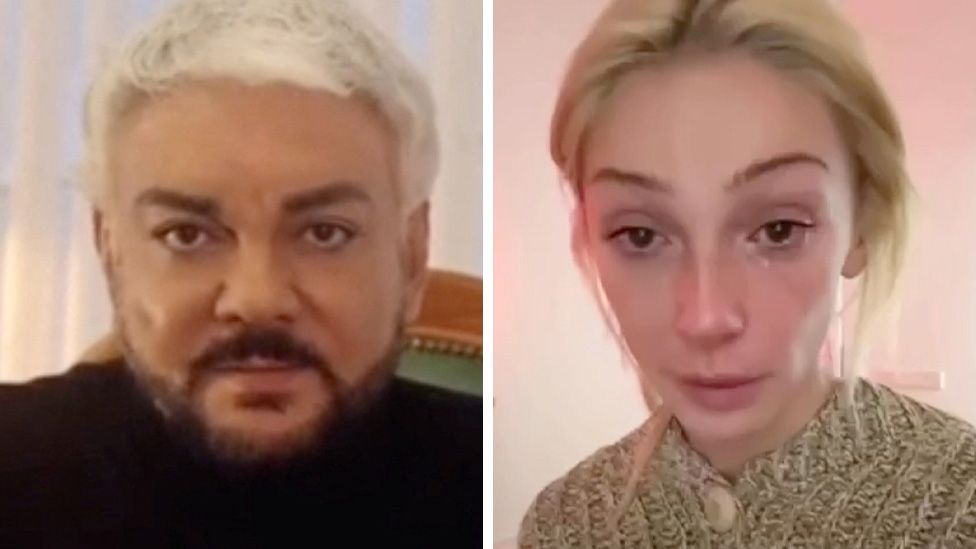2 hours ago
About sharing
At the very end of last year, some of Russia’s top celebrities issued a series of videos apologising for appearing almost naked at a private party.
In the current climate of the war in Ukraine they were condemned for being unpatriotic and their videos were full of remorse.
They had also joined a rapidly spreading culture of apology videos, which have become increasingly prevalent since the full-scale invasion almost two years ago.
But many of the videos are released by police and feature people who have come under far more pressure than the high and mighty of Russia’s pop scene.
Some of the forced apologies were for alleged offences against the Kremlin’s official ideology rather than anything else.
The intention of these videos is two-fold, according to Russian rights lawyer Dmitry Zakhvatov.
To humiliate critics of the war with Ukraine and “to intimidate those who do not support the war but have so far not summoned up the courage to say so in public,” he told the Kavkaz Realii website.
The trend initially came to prominence in 2015, when apology clips started emerging on social media or local state TV in the Russian republic of Chechnya in the North Caucasus.
Most of the videos showed people saying sorry for criticising Chechnya’s strongman leader Ramzan Kadyrov.
One featured a man apologising for being gay. Another featured a man wearing no trousers who had criticised the Chechen leader for singing a song called “President Putin is my best friend”.
The videos soon spread to other parts of the North Caucasus and some were published by police.
In one from the interior ministry in Karachay-Cherkessia, a man apologised for snowboarding down a mountain slope sporting nothing but a thong, similar to that worn by the comedy character Borat.
More recently, since Russia’s 2022 invasion of Ukraine, numerous clips have appeared featuring critics of what it calls its “special military operation”.
Some were published via official police accounts on social media. Many others were posted by pro-war activists or state media, but they also appear to have had some police involvement.
They were filmed in barren rooms typical of police stations and use language characteristic of police reports.
In June last year, a singer called Sharlot burned his passport, saying he did not want to be a citizen of “a criminal Russia” and instead wanted to move to Kyiv in a gesture of support for the Ukrainian people.
He was arrested and soon appeared in a video where he apologised for “a lapse in understanding what is going on”.
In another example, the interior ministry in Chuvashia, a region about 600km (373 miles) east of Moscow, posted a video of a man apologising for defacing pro-war graffiti. He had painted over a red flag and turned it into the Russian opposition’s white-blue-white flag.
Other videos posted by Russian police feature men repenting for offences such as trying to topple a monument in the shape of the letter Z, which has come to symbolise Russia’s war, and setting fire to a pro-war blogger’s door.
There have been accusations that such videos are often recorded under duress.
For example, a blogger known as Nekoglay said police in Moscow forced him to appear on camera after stripping him, beating him up and attempting to rape him with a plastic bottle.
The apology video, released via official news agency Ria Novosti, was posted after he recorded a clip parodying a Russian soldier defending himself from a Ukrainian drone attack.
Apology videos are also being used to shame war critics in Russian-occupied parts of Ukraine.
Two-thirds of the apology videos monitored by Russian human rights website OVD-Info over a period of almost 16 months after the start of the invasion actually came from the occupied region of Crimea.
Russian social anthropologist Aleksandra Arkhipova describes the videos as “rituals of guilt and shame” that amount to extrajudicial punishment.
“This violates internal freedom. This has become the norm, this is very bad. If someone does something wrong, the first thing they’re supposed to do is record an apology video,” she told the BBC.
One woman in Crimea was shown apologising for sharing Ukrainian songs on her social media accounts and another for posting pictures of various objects in the blue-and-yellow colours of the Ukrainian flag.
A puppet theatre actress from occupied Donetsk who was shown saying sorry for sharing Ukrainian songs on TikTok said later she had been pressured into doing it by the police.
“Either you record this video or… you’re going to jail and your child is going to an orphanage,” she quoted a police officer as saying.
Ms Arkhipova believes that the videos are a product of a president who treats Russia like an overbearing father.
“Everyone else is like children who have no legal agency of their own. The father is always right. So if they do anything wrong, they have to apologise to their father.”
She too has come under pressure from Russian authorities, who have designated her as a “foreign agent”.
Related Topics
27 December 2023
13 January
23 December 2023
6 January
